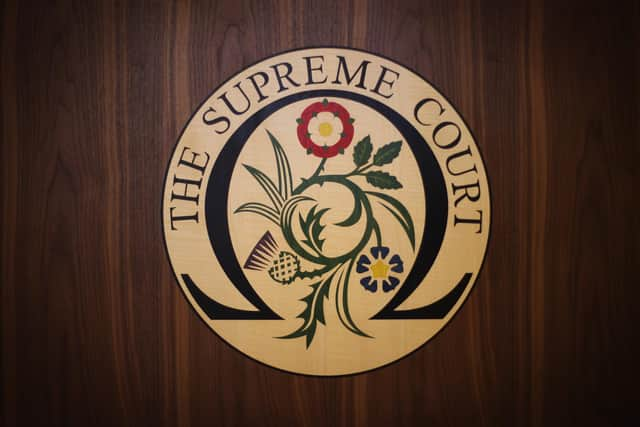Supreme Court indyref hearing favours the technical over spectacle
For aficionados of constitutional law, the opening arguments put forward during the Supreme Court hearing into whether Holyrood can stage an independence referendum without the say-so of Westminster no doubt made for engaging and historic viewing.
For those lacking a detailed understanding of such matters, who perhaps tuned in in the hope of theatrics and impassioned debate, there may be a chill of disappointment. Whatever camp you fall in, the significance of the hearing should not be in any doubt.
Advertisement
Hide AdAdvertisement
Hide AdThe truth is that this was always going to be a dry and, at times, almost inscrutable dissection of technical questions of law.
Throughout the opening morning of the hearing in the wood panelled court, below imposing oil portraits of the Duke of Wellington and Sir John Fielding, Lord Advocate Dorothy Bain KC, the Scottish Government's principal law officer, devoted her time to expanding upon one of her most fundamental arguments.
Namely, that it was in the public interest for the UK’s highest court to settle a question that has defined Scottish politics for a generation, and which remained a “live and significant” concern.
Addressing the court’s president, Lord Reed - a former Court of Session judge - as well as Lord Lloyd-Jones, Lord Sales, Lord Stephens, and Lady Rose, she spoke softly but assuredly in setting out her case, insisting that such a decision would provide “certainty and clarity” to the Scottish Government, the Scottish Parliament, and indeed, the long-suffering Scottish public


“The issue is directly relevant to the central manifesto pledge that has been endorsed by the Scottish electorate,” she said at one point.
At others, Ms Bain delved deep into the joists and bolts of the Scotland Act 1998, insisting that the Scottish Government’s sought after second referendum would not be “self-executing.” The matter at hand, she stressed, was a “genuine issue of law” which, if it is resolved, “could permit the proposed bill to be introduced.”
At others, she drew on the sweeping history of Scottish devolution in service of her legal narrative, referencing figures such as Donald Dewar and, yes, Alex Salmond, as well as quoting from yellowing Hansard transcripts of quarter century old Commons debates involving Michael Ancram.
She also referenced the late Lord Mackay of Drumadoon’s sage warning from 1998 that unless there was resolution around Holyrood’s legislative competence to pass a bill authorising an independence referendum, it would remain a “festering issue.”
Advertisement
Hide AdAdvertisement
Hide AdTime will tell if Lord Reed and his fellow justices are convinced to tend the open wound afflicting Scotland’s constitution, but it will be a lengthy wait.
Lord Reed said Tuesday’s hearing was merely the “tip of the iceberg,” explaining that with upwards of 8,000 pages of written material to consider, it would be “some months” before a judgement is reached.
There will be more detailed arguments submitted in court tomorrow, and contained in those documents. But few could dispute a simpler one put forward by Ms Bain on Tuesday. The issue, she said, is “one of exceptional public importance to the people of Scotland and the United Kingdom.”
Comments
Want to join the conversation? Please or to comment on this article.
